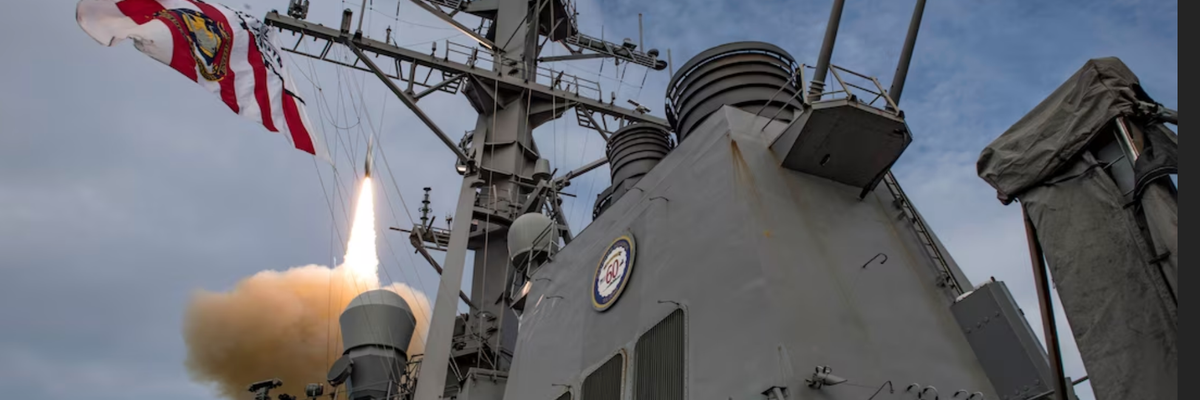On October 19, the USS Carney shot down four missiles and multiple drones fired from Houthi controlled Yemen. Saudi Arabia reportedly intercepted a fifth missile. US officials said the missiles and drones were headed north, possibly toward Israel.
On October 27, what appears to be an errant Houthi drone or missile damaged a building in Taba and a projectile or debris fell near Nuweiba, Egypt.
Yemen’s Houthi rebels, the preeminent military power in Yemen, are in danger of ensnaring themselves and Yemen in an escalatory loop that will lead to a re-acceleration of fighting in Yemen. While the Houthis do possess missiles and armed drones that can reach Israel, neither are likely to evade Israel’s air defenses.
The latest provocations by the Houthis will have no impact on the Israel-Hamas war, but they may provoke retaliatory strikes by the U.S. and its allies. It is probable that the Houthis will respond to any airstrikes by further escalating missile and drone launches which may well target Saudi Arabia and the UAE. The Houthis have successfully targeted sites deep within the territory of both countries, including vital energy infrastructure.
Both Saudi Arabia and the UAE remain involved in the war in Yemen and both will be forced to respond to Houthi led attacks, possibly with renewed airstrikes of their own.
The Houthis, a Zaidi Shi’a group, are allied with Iran and receive material and technical support from Iran. However, they are rooted in Yemen’s socio-cultural matrix. Unlike Hezbollah, Iran has less control over the Houthis’ decision making. Iran can and does limit the operational breadth of Hezbollah and its other proxies. In the case of the Houthis, the most senior leadership, among whom all decisions of consequence are made, is closed to all but the highest-ranking members of the organization.
It is possible that Iran had no foreknowledge of the Houthis’ decision to launch missiles toward Israel.
The Houthis’ decision to launch missiles and drones toward Israel is first and foremost driven by the group’s domestic concerns. The organization faces growing discontent among the 80% of Yemen’s population of 32 million that it rules over. While the Houthis’ brutally efficient security services maintain an iron grip on power in most areas, there are some cracks emerging in the Houthis’ power base. Yemen’s economy is moribund, its currency (divided into a Houthi controlled and government controlled rial) is in free fall, and public sector salaries have not been regularly paid since 2016.
In addition to acute economic problems, which are Yemen-wide, the Houthis have also stoked resentment by recent moves to overtly consolidate their top-down control of northwest Yemen. On September 27, the Houthis announced the dissolution of the National Salvation Government. Abdul Malik al-Houthi, the leader of the Houthis, outlined the need for “radical change, to be commenced with the restructuring of government.”
The speech and the dissolution of the government are in many respects a repudiation of Yemen’s republican history. The “reforms” called for by Abdul Malik also sideline the Houthis’ allies from Yemen’s former ruling party, the General People’s Congress (GPC). The Houthis’ move to formally consolidate their rule over northwest Yemen is a high risk strategy that has fueled resentment among many of the increasingly impoverished Yemenis they rule over.
By launching missiles and drones toward Israel, the Houthis are hoping to distract Yemenis from their failure to deliver economic opportunity. At the same time, the Houthis are well aware of how the launches, at least in the short-term, are to be perceived by many Yemenis. Anti-Israel sentiment in Yemen, as in much of the Muslim world, is high and rising. The Houthis’ attempt to target Israel may be viewed favorably by many Yemenis, even those living outside of Houthi control. The Houthis must also be seen to be abiding by their infamous shi’ar (scream/ slogan) that states, “death to America, death to Israel, curse upon the Jews.”
The Houthis are also keen to further burnish their credentials as a member of the “Resistance.” Iranian financial and material assistance to the Houthis, while often exaggerated, is consequential. Iran has contributed to the Houthis’ development of a wide and growing range of largely domestically assembled missiles and armed aerial and maritime drones.
Ironically, the Houthis’ increasing competence with the development and use of missiles and drones with ever greater ranges combined with their opaque decision making are a liability for Iran. Despite its rhetoric, the Iranian government has little interest in a regional war. The Iranian economy is fragile and the government is contending with significant internal unrest.
Before Hamas’ attack on Israelis, the Houthis and Saudi Arabia were making significant progress in their bi-lateral negotiations with one another. These negotiations were subtly aided by Iran which put pressure on the Houthis to fully engage with the Saudis. The Saudi government recognizes that there is no viable military solution to the problem of Houthi control of northwest Yemen.
Instead, the Saudis sought to engage with the Houthis’ leadership in a way that attempts to foster more moderate members of the organization. At the same time, the Saudis have maintained their support for the Houthis’ domestic rivals, namely the Internationally Recognized Government (IRG) and select forces allied with the IRG.
In the aftermath of the Houthis’ missile launch as well as threats by the group to target ships transiting the Red Sea, Saudi-Houthi negotiations are likely to be paused or shelved indefinitely. If the Houthis’ attacks continue — and it is likely that they will— the prospect of reaching any kind of agreement between Saudi Arabia and the Houthis will dim further.
On October 24, the Houthis appear to have targeted a Saudi military post near Jabel al-Dawd killing four Saudi soldiers. This follows a September 25 attack by a Houthi drone on Bahraini soldiers serving on the Saudi-Yemeni border that resulted in the death of four soldiers. Both attacks are an ominous sign of where Saudi-Houthi relations may be heading.
Unfortunately for Yemen and the region, the Houthis’ ability and willingness to become belligerents in the Israel-Hamas war is going to add fuel to a simmering fire. Despite the expiration of the April 2022 ceasefire, Yemen’s warring parties have avoided a return to widespread fighting due to a delicate balance of power among rivals. The Houthis’ actions and the response they may justifiably illicit from the US and its allies will upset this balance of power.
If this happens, fighting across Yemen will reaccelerate with grave consequences for not only the long-suffering Yemeni people, but also for the wider region. Any new attacks on the Houthis by outside powers will ensure that the hardliners who are ascendant within the organization predominate. This will all but guarantee the start of an escalatory cycle with few off-ramps.
- UPDATE: US troops in Iraq, Syria fending off spate of armed attacks ›
- Tracking the US military build-up today in the Middle East ›
- Yemen’s drone doom loop: A model of instability for fragile states - Responsible Statecraft ›
- Houthis are playing with fire. But who gets burned? - Responsible Statecraft ›
- Houthi rivals in Yemen want to exploit Red Sea rift | Responsible Statecraft ›
- US push to expand anti-Houthi coalition miffs allies | Responsible Statecraft ›
- Dem, GOP Lawmakers say Biden had no authority to launch Yemen strikes | Responsible Statecraft ›
- US strikes on Yemen won't solve anything | Responsible Statecraft ›
- Why Israel won't beat the Houthis | Responsible Statecraft ›
- Israel playing with fire in Yemen | Responsible Statecraft ›
















